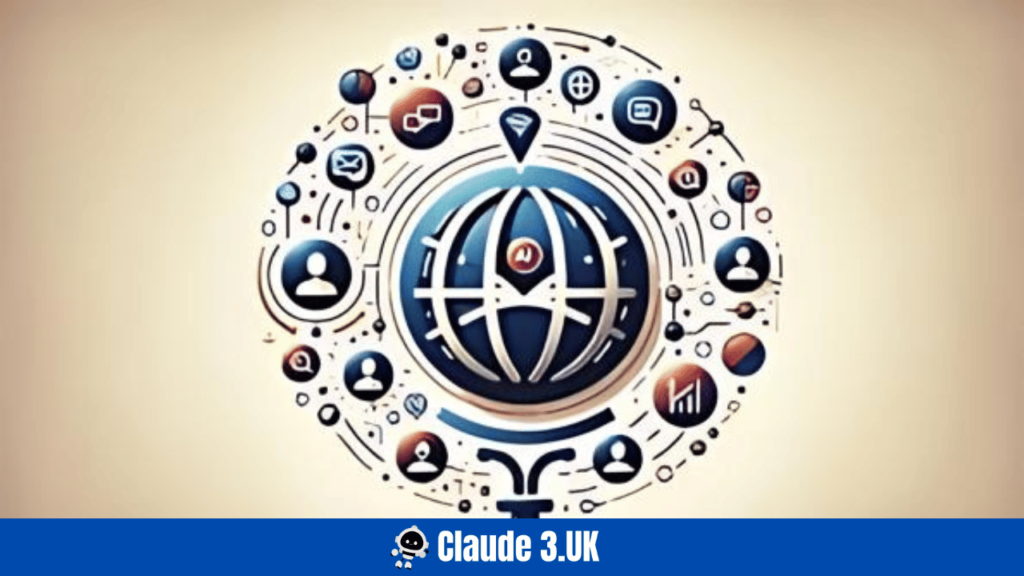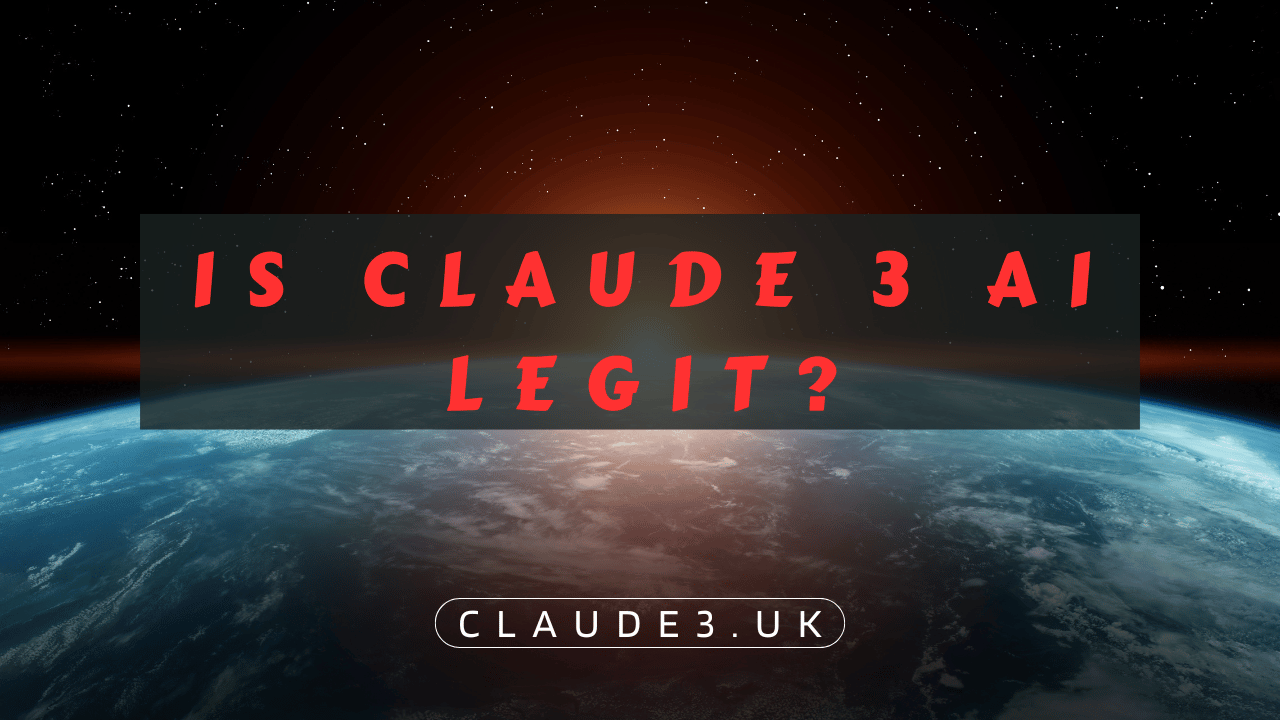In the rapidly evolving field of artificial intelligence (AI), new models and technologies frequently emerge, each claiming to offer cutting-edge capabilities and transformative potential. Among these innovations is Claude 3 AI, developed by Anthropic.
This AI chatbot has garnered significant attention for its advanced conversational abilities, ethical design, and wide range of applications. However, with the proliferation of AI technologies, it is crucial to assess the legitimacy and effectiveness of such models.
This article provides a comprehensive examination of Claude 3 AI, exploring its design, functionality, use cases, ethical considerations, and overall legitimacy.
What is Claude 3 AI?
Claude 3 AI is an advanced conversational AI model developed by Anthropic. It utilizes large neural networks trained on vast amounts of text data to understand and respond to user inputs in a human-like manner.
Claude 3 is designed to be safe, ethical, and helpful, with the aim of producing honest and harmless content. It can perform a variety of tasks, including text generation, image reading, contextual understanding, research support, and data processing.
The Development Team: Anthropic
Anthropic is a research company focused on creating AI systems that are both beneficial and aligned with human values. The team behind Claude 3 comprises experts in AI, machine learning, and ethics. Their mission is to develop AI technologies that are safe, ethical, and capable of addressing real-world challenges.
Architecture and Functionality of Claude 3 AI
Neural Network Architecture
Claude 3 AI’s architecture is based on large neural networks, specifically designed for natural language processing (NLP). These neural networks consist of multiple layers of interconnected nodes (neurons) that process and analyze text data. The architecture enables Claude 3 to learn patterns, understand context, and generate coherent responses.
Training Data and Methods
Claude 3 is trained on a diverse range of text sources, including books, articles, websites, and more. The training process involves supervised learning, where the model is provided with labeled examples, and reinforcement learning, where it learns from feedback. Fine-tuning techniques are also applied to enhance the model’s performance and ensure it produces accurate and relevant responses.
Key Capabilities
- Text Generation: Claude 3 can generate summaries, creative works, and even code based on user prompts.
- Image Reading: The AI can interpret images, extract relevant information, and provide descriptions or insights.
- Contextual Understanding: Claude 3 can understand and retain large amounts of context, ensuring coherent and relevant interactions.
- Research Support: The AI can assist in research by analyzing data, generating ideas, and providing insights.
- Data Processing: Claude 3 can process and interpret data, perform calculations, and generate reports.
Practical Applications of Claude 3 AI
Education
In the educational sector, Claude 3 can serve as a virtual tutor, providing explanations, answering questions, and assisting with homework. Its ability to generate content and understand complex queries makes it a valuable tool for students and educators alike.
Business
Businesses can leverage Claude 3 for customer support, content creation, and data analysis. The AI can handle customer inquiries, generate marketing content, and assist in decision-making processes by analyzing data and providing insights.
Healthcare
In healthcare, Claude 3 can assist with administrative tasks, patient support, and data analysis. It can process patient records, provide relevant information to healthcare professionals, and enhance the overall efficiency of healthcare services.
Creative Industries
Creative professionals can use Claude 3 to generate ideas, write scripts, and create content. The AI’s ability to produce coherent and creative text makes it a valuable assistant in writing, advertising, and media production.
Evaluating the Legitimacy of Claude 3 AI
Performance and Accuracy
The legitimacy of an AI model is largely determined by its performance and accuracy. Claude 3 has demonstrated high proficiency in generating coherent and contextually appropriate responses. However, like all AI models, it is not infallible and may produce errors or inaccuracies, particularly with complex or ambiguous queries.
Ethical Considerations
Claude 3 is designed with a strong emphasis on ethics. The developers at Anthropic have implemented measures to ensure that the AI produces safe and harmless content. Ethical considerations are integrated into the model’s design, preventing it from generating harmful or biased responses.
User Reviews and Feedback
User reviews and feedback provide valuable insights into the legitimacy of Claude 3. Many users have reported positive experiences, praising the AI’s ability to generate accurate and helpful responses.
However, some users have noted limitations, such as occasional inaccuracies and difficulty with complex tasks. Overall, the feedback suggests that Claude 3 is a reliable and effective AI tool.
Comparison with Other AI Models
Comparing Claude 3 with other AI models helps to contextualize its legitimacy. Claude 3 is often compared to models like OpenAI’s GPT-4 and Google’s Bard. While each model has its strengths and weaknesses, Claude 3 is recognized for its strong ethical foundation and versatility. It performs competitively in terms of text generation, contextual understanding, and user interaction.
Ethical and Safety Measures
Avoidance of Harmful Content
Claude 3 is programmed to avoid generating harmful or biased content. The developers have implemented filtering mechanisms and ethical guidelines to ensure that the AI produces safe and respectful responses. This commitment to safety and ethics enhances the AI’s legitimacy and reliability.
Data Privacy and Security
Claude 3 is designed to prioritize data privacy and security. It does not collect or store personal information, ensuring that user interactions remain confidential. This focus on privacy is crucial in maintaining user trust and upholding ethical standards.
Transparency and Accountability
Anthropic is committed to transparency and accountability in the development and deployment of Claude 3. The company provides detailed information about the AI’s capabilities, limitations, and ethical guidelines. This transparency fosters trust and allows users to make informed decisions about using the AI.
Limitations and Challenges
Data Accuracy
While Claude 3 is highly advanced, it has limitations in data accuracy. Its training data only goes up to August 2023, meaning it may not have the most current information. Users should verify critical information from up-to-date sources when using the AI for decision-making.
Math-Solving Capabilities
Claude 3 has limited capabilities in solving complex mathematical problems. While it can perform basic calculations and data processing, more advanced mathematical tasks might require specialized tools or human expertise.
Dependency on User Input
Claude 3’s performance is heavily dependent on the quality and context of the data provided by the user. Inaccurate or incomplete input can lead to suboptimal responses, highlighting the importance of clear and precise queries.

Future Prospects and Developments
Enhancements in Understanding and Generation
Future iterations of Claude AI are likely to feature improvements in understanding and text generation, making the AI even more capable and versatile. Enhanced algorithms and larger training datasets will contribute to these advancements.
Integration with Other Technologies
Integration with other technologies such as natural language processing (NLP) tools, machine learning frameworks, and cloud services could expand Claude 3’s functionality. These integrations will enable more complex applications and seamless interactions with other systems.
Expanding Safety and Ethical Measures
As AI continues to evolve, so will the safety and ethical measures surrounding its use. Future versions of Claude AI will likely incorporate advanced safeguards to ensure responsible usage and minimize potential harm.
Conclusion
Claude 3 AI, developed by Anthropic, is a sophisticated conversational model designed to be safe, ethical, and helpful. Its advanced neural network architecture, diverse training data, and strong emphasis on ethics make it a legitimate and reliable AI tool.
While it has limitations in data accuracy and math-solving capabilities, its overall performance and design principles ensure that it remains a powerful and effective AI assistant.
The legitimacy of Claude 3 AI is supported by its strong performance, ethical considerations, positive user feedback, and commitment to transparency.
As AI technology continues to advance, Claude 3 is well-positioned to remain at the forefront of conversational AI, offering valuable assistance across various applications.
With ongoing improvements and future developments, Claude 3 is set to become even more capable and versatile, further solidifying its legitimacy and effectiveness in the AI landscape.
FAQs
Is Claude 3 AI a legitimate AI tool?
Yes, Claude 3 AI is a legitimate AI tool. It is designed to be safe, ethical, and helpful, with a strong emphasis on producing honest and harmless content.
What makes Claude 3 AI ethical?
Claude 3 AI is programmed to avoid generating harmful or biased content. It adheres to ethical guidelines and has filtering mechanisms to ensure safe and respectful interactions.
Can Claude 3 AI be trusted for professional use?
Claude 3 AI is designed to be reliable and effective for various applications, including education, business, healthcare, and creative industries. However, users should verify critical information from up-to-date sources.
How does Claude 3 AI compare to other AI models?
Claude 3 AI is competitive with other leading AI models like GPT-4 and Google’s Bard. It is recognized for its ethical foundation, versatility, and strong performance in text generation and contextual understanding.
Are there any limitations to Claude 3 AI?
Yes, Claude 3 AI has limitations, including data accuracy (limited to information up to August 2023) and limited math-solving capabilities. Its performance also depends on the quality of user input.
What future developments are expected for Claude 3 AI?
Future developments may include enhancements in understanding and text generation, integration with other technologies, and expanded safety and ethical measures to ensure responsible AI usage.
